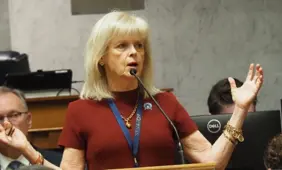The 'Non-Sportsbook' Kalshi to Offer Prop, Spread Betting
Kalshi, a federally regulated prediction market, is preparing to branch into football wagering with new contracts that mimic sportsbook-style bets. According to documents submitted to the Commodity Futures Trading Commission (CFTC) on August 18, the exchange has filed templates for point spreads, totals, and touchdown scorer markets. These submissions fall under the exchange's self-certification process, which allows products to launch unless the CFTC steps in to block them.

The paperwork describes three primary contract types. The spread market asks whether a team will win by more than a designated margin. The totals market determines if a game ends above or below a set point threshold, with the option to apply bets to specific quarters or periods.
Related: Kalshi Follows Crypto.com Into Sports BettingThe touchdown contracts focus on whether a player or team records a touchdown within a defined span of play. The filings name these products Footballspread, Footballtotals and Footballtouchdown, indicating potential availability for both pro and college football, although some states, like Ohio, currently disallow player-based props in college contests.
Kalshi stated that bringing these contracts to its exchange places sports wagers under CFTC oversight, aligning consumer safeguards with those found in financial markets. The company framed the move as an effort to compete with the estimated $84 billion illegal sports betting sector by offering a legal, transparent and federally supervised alternative. It added that interest in regulated trading options continues to climb and said its products are designed to meet that demand with liquidity and competitive pricing.
The company said the contracts could become available following the market close on August 18, unless the CFTC intervenes. Under the self-certification structure, the regulator has three choices: permit the contracts without objection, reject them outright, or begin a 90-day review to evaluate their consistency with public interest standards.
Acting CFTC Chair Caroline Pham has previously noted that the agency has never denied a self-certification request in its 50-year history. All of Kalshi's prior sports-related products have been introduced this way.
More Business
Kalshi Embracing Sports Betting
The proposed football wagers reflect the most popular offerings at traditional sportsbooks like FanDuel and DraftKings, where spreads, totals, and player props account for a large portion of betting activity. Kalshi has already experimented with parlay contracts on non-sports outcomes such as the Oscars and the Grammys, and analysts suggest that adding props could eventually lead to parlay-style products in sports.
However, because Kalshi operates as an exchange, building same-game parlays is more complex since each side requires a trading partner. Sportsbooks, by contrast, can simply multiply odds, even when the events are correlated.
If Kalshi moves toward parlays, liquidity providers will likely be essential. Firms like Susquehanna International Group, along with Kalshi's own trading arm, have been active participants and could help balance pricing and ensure smooth markets. In the sportsbook industry, same-game parlays carry high profit margins, often with hold rates over 15%, which may encourage market makers to support them in Kalshi's exchange environment.
Rules for touchdown scorer contracts have also been detailed. To be eligible, a player must be on the field for at least one snap. If they never appear, the contract closes at the final recorded price before kickoff. Once active, settlement depends solely on actual touchdowns scored, regardless of injury, ejection, or limited playing time. Passing touchdowns are excluded, and Kalshi has not yet filed contracts for other statistics like receiving yards or catches.
Participation restrictions are also included. For NFL markets, current and former players, coaches, team staff, league employees, and their immediate families or household members are barred. In college football, athletes, coaches, and staff connected to the teams involved cannot participate.
The NCAA already enforces similar bans, including prohibiting Division I players from betting on their own games or sport. The filings extend restrictions further to cover ultimate beneficial owners and employees of related organizations.
RELATED TOPICS: Business
Most Read
Must Read
 Interviews
Interviews
Exclusive Interview: Levon Nikoghosyan Shares AffPapa Winning Formula for Successful iGaming Events
Dec 03, 2025 Interviews
Interviews









Review this New Post
Leave a Comment
User Comments
Comments for The 'Non-Sportsbook' Kalshi to Offer Prop, Spread Betting